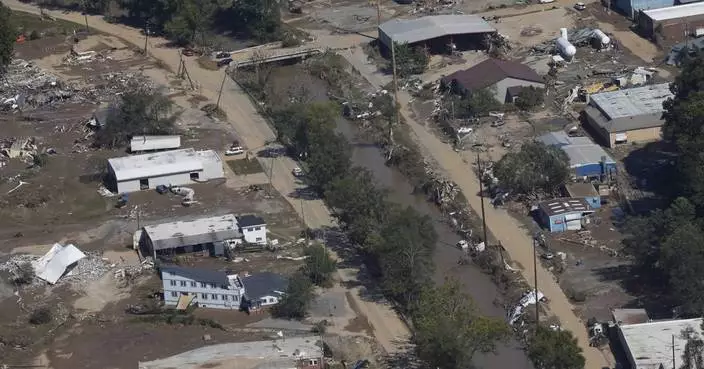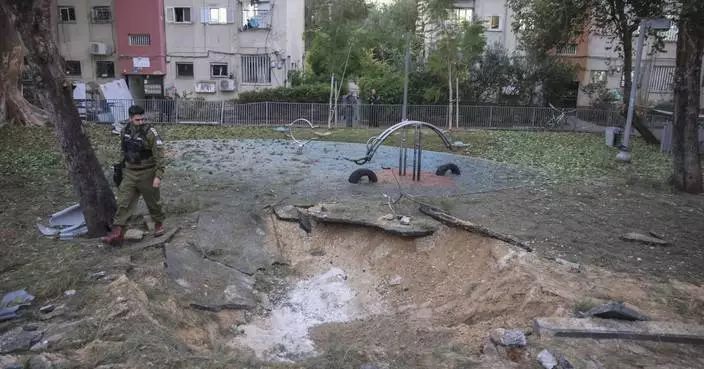BRUSSELS (AP) — Senior government ministers from Ireland, Luxembourg and Belgium took a very public swipe at Hungary on Tuesday, raising questions about whether Prime Minister Vitkor Orbán’s stridently nationalist cabinet respects European Union values and standards.
Hungary took over the 27-nation bloc’s rotating presidency in July. Orbán immediately made a surprise trip to Moscow to meet with Russian President Vladimir Putin, angering several of his EU counterparts, who insisted that the Hungarian leader did not represent them.
“I will ask also my colleague (European Affairs Minister János Bóka) if tomorrow he plans a trip to Moscow, because this seems to be a habit for Hungarian politicians,” Luxembourg Foreign Minister Xavier Bettel said at a meeting in Budapest.
Beyond its ties with Russia, Orbán’s government has irritated its EU partners by promoting hostility to migrants and LGBTQ+ rights, and by controlling public media. Millions of euros in EU funds have also been frozen over concerns about democratic backsliding in Hungary.
Bettel, his Belgian counterpart Hadja Lahbib and Irish European Affairs Minister Jennifer Carroll McNeill said that they had held joint meetings with members of the Hungarian media, civil society and LGBTQ+ representatives ahead of Tuesday’s meeting, which Bóka chaired.
“This is extremely important to us in Ireland: human rights, fundamental freedoms, rule of law,” Carroll McNeill said. “I’m pleased to be here with my colleagues to just further discuss the rule of law and the concerns that we have and as they relate to the future of Europe.”
The ministers made their statements directly to a Hungarian TV camera, without prompting from reporters. It was an unusual and potentially embarrassing public display for Hungary, given that EU member countries rarely criticize each other in public.
Lahbib said she would send a message that “the Hungarian presidency should be ambitious, that it works to unite, to build bridges between the 27 European Union member states.” She urged Budapest to lift its veto on EU funds helping to supply weapons to Ukraine.
Many EU countries have been sending lower-level officials to meetings hosted by Hungary in protest at its conduct. Last week, EU foreign policy chief Josep Borrell also used his convening powers to shift a gathering of the bloc’s foreign ministers from Budapest to Brussels.
At Tuesday’s meeting, things were taken to a new level.
“For me it was important to be in Budapest today. You know, big questions: do we come, don’t we come, should we come, is it good to come, is it better to boycott,” Bettel mused. “Not being here would, I think, be an error. But being here means also to be loud.”
Bóka played down the tensions, saying that the ministers had informed him of their meetings and that he saw no problem with this.
He said that more than half of the member countries were represented at senior level, although he conceded that the EU’s executive branch, the European Commission, had not sent one of its policy commissioners as it usually does.
“The atmosphere of today’s council reflected a sense of cooperation, and a willingness on the part of member states to cooperate with the Hungarian presidency, and I welcome this,” Bóka told reporters after the meeting had concluded.
Hungary’s mandate at the EU helm ends on Dec. 31.

European Affairs Minister Janos Boka of Hungary speaks during the informal meeting of the EU General Affair council in Budapest, Hungary, Tuesday, Sept. 3, 2024. (Zoltan Mathe/MTI via AP)
The path for the NFL's Washington Commanders to return to the nation’s capital is clear after an on-again, off-again saga in Congress ended early Saturday with a postmidnight reprieve.
The U.S. Senate passed a resolution to transfer the land including old RFK Stadium from the federal government to the District of Columbia. The D.C. Robert F. Kennedy Memorial Stadium Campus Revitalization Act passed by voice vote at roughly 1:15 a.m. after more than a year of lobbying and support from Rep. James Comer, R-Ky., district Mayor Muriel Bowser, Commanders controlling owner Josh Harris and NFL Commissioner Roger Goodell.
“We are extremely grateful that our elected officials have come together on a bipartisan basis to give Washington, D.C., the opportunity to decide on the future of the RFK Stadium site," Harris said. "This bill will create an equal playing field so that all potential future locations for the home of the Washington Commanders can be fairly considered and give our franchise the opportunity to provide the best experience for all of our fans.”
The RFK Stadium land provision was part of Congress’ initial short-term spending bill Tuesday before it was torpedoed by President-elect Donald Trump and Elon Musk, the latter of whom amplified misinformation about the site on his social media platform X. Two versions of the House's slimmed-down bill, including the one that passed Friday night to avoid a government shutdown, did not include it.
Giving the local government control of the land for the next 99 years allows for the decaying husk of the old stadium to be torn down and the site redeveloped for any number of things. One of the possibilities is a football stadium and surrounding entertainment options at the franchise's former home.
“We appreciate the bipartisan group of Congressional leaders who made this important breakthrough possible,” the NFL said in a statement. “Washington, D.C., will now have a long-overdue seat at the table when it comes to the location of a new Commanders stadium.”
Bowser called it “a win for D.C., for our region and for America.”
“Everybody loves a good comeback story — and that’s D.C.’s story,” she said.
All that awaits is President Joe Biden's signature to become law, which could come as soon as Saturday. Comer went as far as saying that Senate passage of the bill is “a historic moment for our nation's capital.”
“If Congress failed to act today, this decaying land in Washington would continue to cost taxpayers a fortune to maintain,” he said. “Revitalizing this RFK Memorial Stadium site has been a top economic priority for the city. ... This bipartisan success is a testament to the House Oversight Committee’s unwavering effort to protect taxpayers and our full commitment to ensuring a capital that is prosperous for residents and visitors for generations to come.”
Playing in Washington again is no sure thing. The Commanders are also considering other places in the district, Maryland and Virginia to build a stadium in the coming years.
Their lease at Northwest Stadium in Landover, Maryland, runs through 2027. Harris called 2030 a “reasonable target” for a new stadium.
The team played at RFK Stadium 2 miles (3.22 kilometers) east of the Capitol from 1961-96 before moving to Maryland. Harris and several co-owners, including Mitch Rales and Mark Ein, grew up as Washington football fans during that era, which included the glory days of three Super Bowl championships from 1982-91.
Ein said on social media, “Still many steps to go and even bigger than a possible stadium last night’s bill was an extraordinary moment of bi-partisan and regional cooperation to do something big and important and get 174 acres of unused, blighted and critical land to DC so they can bring it back to life.”
Part of the way the provision got into the bill initially involved an agreement between the team and Maryland to tear down the current stadium in a timely fashion and redevelop the site with a project of equal economic impact, a person with knowledge of the situation told The Associated Press earlier this week on condition of anonymity because the deal was not being publicized.
After the Senate greenlit the RFK Stadium land transfer, Maryland Sens. Ben Cardin and Chris Van Hollen, both Democrats, said they continued to believe their state's partnership with the team should continue long into the future.
“After working to level the financial playing field, and receiving assurances that should the team move they will redevelop the existing site in a manner that meets the needs of the community, tonight we supported the proposed land transfer legislation,” Cardin and Van Hollen said. "We have always supported the District’s effort to control its own land, and through regional discussions and cooperation, our concerns with this proposal have been addressed.”
The team has played games in Maryland since 1997 and practices in Ashburn, Virginia, not far from Dulles International Airport.
A return to the district would be another victory for Bowser, who on Thursday celebrated the start of an $800 million downtown arena renovation that is keeping the NBA's Wizards and NHL's Capitals in town. At that news conference, she took aim at Musk for sharing incorrect information on X, formerly Twitter, about taxpayers footing the bill for a new stadium.
The bill specifically prohibits the use of federal funds for a stadium on the site, “including training facilities, offices, and other structures necessary to support a stadium.”
AP NFL: https://apnews.com/hub/nfl

FILE - A vehicle pushes up pikes of snow after trucks dump their loads of snow in the parking lots of RFK Stadium in Washington, Monday, Jan. 25, 2016. (AP Photo/Susan Walsh, File)











